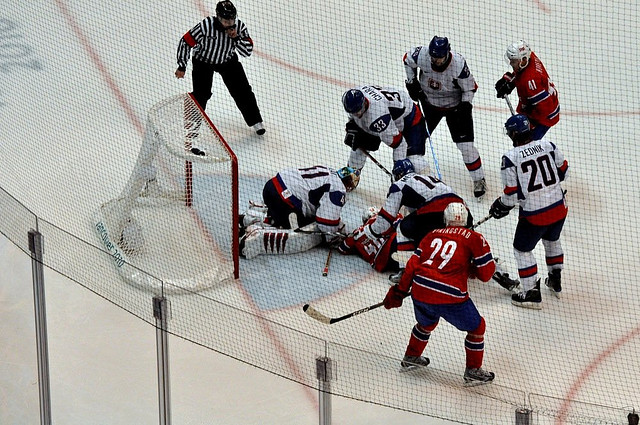"Olympic legacy: we should all be able to participate"
February 17th, 2014 The Olympic Games create a legacy, according to event organizers, but do they encourage participation in sports? Alvin Ma, 22, a Commonwealth Correspondent from Canada, argues that watching Olympic sports does not translate into mass participation at the amateur level.
The Olympic Games create a legacy, according to event organizers, but do they encourage participation in sports? Alvin Ma, 22, a Commonwealth Correspondent from Canada, argues that watching Olympic sports does not translate into mass participation at the amateur level.
At a recent academic conference, I presented on Asian student experiences in my university’s kinesiology program and drew upon the popular “Proud Fathers” television commercial from Canada’s Tim Hortons chain of coffee shops (again).
In Canada, Tim Hortons initially ran that ad during the 2006 Winter Olympics and followed up with another multicultural ad entitled “Welcome Home” during the 2010 Winter Olympics. From Tim Hortons’ marketing standpoint, it seems that the Olympics can serve as the visual site of cultural integration.
While neighboring American statistics indicate that ethnic minorities disproportionately watch less of the Olympics, the Nielsen ratings do not categorize by the type of sport in the Olympic Games. With the National Hockey League already holding the “least diverse” audience distinction in the United States, it is a low bar for the Olympics to surpass the top professional ice hockey league in ethnic minority viewership.
In the Canadian context, with a reported 26.5 million (80 per cent of all Canadians) watching at least part of the men’s ice hockey gold medal game in 2010 – smashing all previous records of hockey viewership – it can be inferred that many non-traditional fans watched ice hockey for the first time. In the non-traditional fans group are those who belong to an ethnic minority, and of those people categorized, some might have become ice hockey fans. Of those newly-turned ice hockey fans, some might not have the resources to participate themselves. It would be incorrect to say that ethnic minorities are, as a generalized block, poor. At the same time, the ethnic diversity of the people participating, particularly those at the high-performance level, is not always indicative of the broader demographics of Canada.
While immense caution should be taken to not interchange the word “ethnic minority” with “immigrant,” research suggests that the participation rate of immigrants in sport is much lower than that of non-immigrants. A research paper for Statistics Canada reported in 2005 that the participation rate of recent immigrants is 27 per cent, three percentage points below the Canadian-born rate. Immigrants who came to Canada before 1990 were participating even less in sport, with a rate of only 19 per cent. Moreover, the same study looked at the participation rate of children of immigrants who had been in Canada for less than ten years and states that they are less likely to participate in sports, at the rate of 32 per cent, than children of Canadian-born parents, at the rate of 55 per cent.
In general, official ice hockey participation has declined significantly despite Olympic gold medal success in both men’s and women’s ice hockey at the 2010 Winter Olympics. This supports the findings of research that downplay the trickle-down effect of elite sport success translating into mass sport popularity.
In order to justify the extraordinarily expensive two-week event every two years, the Olympic organizing committees often boast of sustainable legacies that will continue to benefit host cities for years to come. In the same spirit, I believe that much more of an emphasis needs to be placed on local and global legacies that foster amateur participation with an equitable focus on inactive marginalized individuals and groups.
As the champion of Olympism Pierre de Coubertin notes: “L’important dans la vie ce n’est point le triomphe, mais le combat, l’essentiel ce n’est pas d’avoir vaincu mais de s’être bien battu” (The important thing in life is not the triumph but the struggle, the essential thing is not to have conquered but to have fought well).
Or in a take-away translation that relates back to Tim Hortons and the slogan of its children’s ice hockey program: “The first goal is having fun.”
photo credit: mariskar via photopin cc
…………………………………………………………………………………………………
About me:
I’m currently a student and research assistant for the Centre for Sport Policy Studies at the University of Toronto. I also teach English at an ESL language school and serve as a private tutor for various other subjects. Passionate about teaching, sports, and politics, I hope to blend these interests and one day teach university-level courses on the politics of sports.
………………………………………………………………………………………………………
Opinions expressed in this article are those of the author and do not necessarily represent the views of the Commonwealth Youth Programme. Articles are published in a spirit of dialogue, respect and understanding. If you disagree, why not submit a response?
To learn more about becoming a Commonwealth Correspondent please visit: http://www.yourcommonwealth.org/submit-articles/commonwealthcorrespondents/
…………………………………………………………………………………………………




